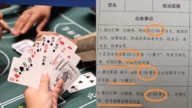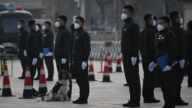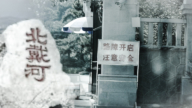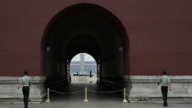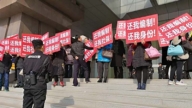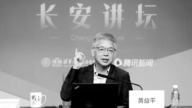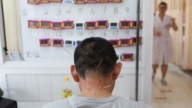【新唐人2014年03月10日訊】十八大以來,中共把反腐敗上升到「亡黨亡國」的高度,一時間不少「蒼蠅」、「老虎」紛紛落馬。不過,這對貪官遍地的中國無異於杯水車薪,「大老虎」、「大大老虎」依然活躍在臺上。不過最近北京市有官員透露,北京市正在研究官員房產申報登記制度,在廣州市也有類似的舉動。中共真敢啟動反腐利器——被譽為「陽光法案」的「官員財產公示」嗎?請看報導。
北京常務副市長李士祥在3月7號聲稱,北京正研究實施官員財產申報制度,市領導已全部開始登記房產狀況,「包括我的房產,住哪?多大面積?商品房還是政策房?戶主是誰?」登記工作正在進行。
但是,他並沒有指明,這些資訊將由當局保存,還是可以讓更多的人看到。
日前,廣州也已經通過討論,讓南沙區作為試點,處級以上領導幹部將進行財產公開申報。
美國中文雜誌《中國事務》總編輯伍凡:「這不是法律,如果是法律你非得遵守,不遵守你要坐牢。它沒有定法律,還是共產黨內部的家規。」
從上世紀90年代,中共就曾把「財產收入申報法」列入立法規劃,但都因反對太多而擱淺。
從上世紀90年代中期,中共還多次出臺要求黨政機關縣處級以上領導幹部收入申報的規定。而且,從2010年開始,縣處級以上的領導幹部,必須向組織申報的個人事項,增加到房產、投資、配偶子女工作、經商等14項內容,還在全中國27個市縣做過試點,其中有重慶市的黔江區、江北區、寧夏銀川市、江蘇淮安市等。
但目前,官員財產公示依然是「硬骨頭」。
美國中文雜誌《中國事務》總編輯伍凡認為,這次的官員財產申報試點,當然是上面授意的。
伍凡:「想收攏民心,改變老百姓對共產黨貪污、腐敗的那種看法:你們的財產從來不公布,貪污多少從來不公布。但是有一個問題,你公布的財產誰來做鑑定,可靠嗎?是不是有打埋伏?」
中共官場向來都是「上有政策,下有對策」,媒體揭示的就證明了這一點。
有「房姐」之稱的龔愛愛,是陝西省神木縣農村商業銀行副行長、以及榆林市的人大代表。她有三個假戶口,從2005到2012年間,她先後在北京購買房屋44套,有商鋪、寫字樓、公寓、住宅等,購房合同總價3億9000多萬元。
另外,有「房爺」之稱的廣東省陸豐市公安局原黨委委員趙海濱,他也被曝光有「雙重身份」,擁有192套房產。
伍凡指出,如果反腐不制定法律制度,不讓媒體和老百姓參與監督,那都是空的、假的,那也只是中共在受到輿論壓力下做的樣子而已。
大陸維權律師趙永林:「我前幾天在東北有一個案子。我們向他遞交律師辯護手續,他就是不接。他說我們不接你外地的律師,不允許外地的律師代理。我就問他,法律規定的很清楚,你憑甚麼這樣說啊?沒法律規定,我們本地就是這樣研究的。」
大陸維權律師趙永林認為,如果中國目前政治體制不改,即使有法律,並且無論法律規定多具體、清楚,對於那些根本沒把法律放在眼裡的官員來說,就沒有任何實質的意義,在執行過程中也起不到效果。
趙永林指出,沒有外在的壓力,自己監督自己很難真正做到公正,也有很多辦法逃避。
大陸「人民大學」社會學教授周孝正曾指出,要反腐,真正的解決途徑還是在於,中共必須「把權力關進制度的籠子裡」,必須要全面落實依法治國的基本方略,所有的組織和機構,包括武裝部隊,那些掌握權力的統治者,都必須在憲法和法律的範圍內活動。
而現實中,中共把「要求財產公示」的江西維權人士劉萍、北京法學者許志永等都判了刑。他們都是在憲法框架允許的範圍內進行活動。
這就是中共對財產公示和遵守憲法的最終回答。
採訪/易如 編輯/宋風 後製/蕭宇
Another CCP Official Asset Declaration Test Program Reported:
Is This One Real?
In its 18th National Congress, the Chinese Communist Party
(CCP) described corruption as a threat to the entire regime.
Since then many “flies” or “tigers”—officials – have fallen.
However, these efforts are nearly useless,
as corrupt officials are seen everywhere in China.
Many “tigers” and “big tigers” are still active
on China’s political stage.
Recently, it was disclosed that some Beijing officials
revealed that the city is working on a property declaration
system for party officials.
Similar things have also been reported in Guangzhou.
Will the CCP be serious this time in suppressing corruption
by establishing an official asset declaration system,
or the “sunshine law”?
Let’s look at the following report.
Li Shixiang, Executive Vice Mayor of Beijing, announced
on March 7 that the city is currently working on a system
for officials to declare their assets; all municipal leaders
have begun to register their property information.
The questions to answer include “where do I live?”,
“How large is my house?”, “Is it commercial or distributed
by government?” and “who is the house owner?”
Li said the registration work is in progress.
However, Li did not mention whether the information
will be kept confidential with the CCP regime
or made available to all Chinese people.
Recently, Guangzhou also started a test program
in Nansha District, where all officials higher than
divisional-level are required to declare their assets
to the public.
Chris Wu, China Affairs magazine editor-in-chief:
“It has yet to become a law.
If it is a law then you have to abide by it.
Otherwise you will be put into prison.
The CCP has not made it a law.
So it is still a “family rule” inside the party.
As early as the 1990’s, the CCP has included
“Asset Declaration Law” in its legislative plan.
However, the plan had been suspended
due to strong opposition.
Since the mid 90’s, the party had repeatedly required
officials above the divisional-level to declare their income.
Furthermore, since 2010 all officials above county-level
have to register more personal information,
including properties, investment, job positions held by their
spouse and children, the status of their business and others.
Test programs were run in 27 cities or counties
all over China, including Qianjiang District
and Jiangbei District in Chongqing, Yinchuan City in Ningxia,
and Huai’an City in Jiangsu.
On the other hand, declaration of officials’ assets remains
a tough task.
Wu Fan, editor-in-chief of China Affairs magazine,
said there is no doubt that the asset declaration
test programs for officials are inspired by higher-ups.
Wu Fan: ”The move is made to change public opinion
about the party’s corruption, as they never announce
the truth about assets of party officials
and their embezzlement.
But the question is who will be responsible
to verify the announced numbers?
Are they reliable?
Is there any hidden truth behind what is declared?”
Among the CCP’s political circles, the localities always
have their countermeasures to policies made by higher-ups.
This can be seen from many media reports.
For example, Gong Aiai, nicknamed the “House Sister,”
is former deputy head of a rural bank in Shenmu County
of Shaanxi Province and a People’s Congress deputy
to Yulin City.
She registered three false households.
Between 2005 and 2012, she purchased 44 houses in Beijing,
including shops, offices, apartments and residences.
The total amount of her house purchase contracts
has reached over 390 million Yuan ($64 million).
In addition, Zhao Haibin, known as the “House Grandpa,”
is a former party committee member
of public security bureau in Lufeng, Guangdong.
He also reportedly owned 192 properties
purchased with two identities.
Wu Fan commented that without establishment
of an anti-corruption law and supervision by media and all
Chinese citizens, no measures will ever be effective, as they
are only used by the party when it is under media pressure.
Zhao Yonglin, Chinese Human Rights Lawyer: “Days ago
when I submitted an application for lawyer defense
in Northeast China, my application was denied by the court.
I was told that non-local lawyers are not allowed
to be defense agents.
I asked, ‘how can you say that? It is completely legal’
They said, ‘There is no law about this,’ ‘Locally we just follow
our rules’.”
Zhao Yonglin commented that under the current CCP
political system, even if there is a clearly defined law,
it means nothing to party officials who never
take the law seriously.
The law will never be effective when you try to execute it.
Zhao said without external pressure, so-called
self-supervision will never result in fairness
as there are numerous ways to conceal the truth.
Zhou Xiaozheng, professor of sociology at Renmin University
of China once said that the real solution to the CCP’s
corruption still has to be “caging off the power
with a legal system.”
Zhou said it is a must to completely follow the principle
of “rule by the law”; all organizations and agencies,
including militaries and powerful governors,
must act within the restrictions of constitution and law.
But the reality is the party has put asset declaration activists
into prison, including Liu Ping from Jiangxi and Beijing legal
scholar Xu Zhiyong, although Liu and Xu’s activities
should be completely protected by the CCP’s constitution.
By doing that, the CCP has already made up its mind
on the issues of officials’ asset declaration
and constitutionalism.
Interview/YiRu Edit/SongFong Post-Production/XiaoNing


